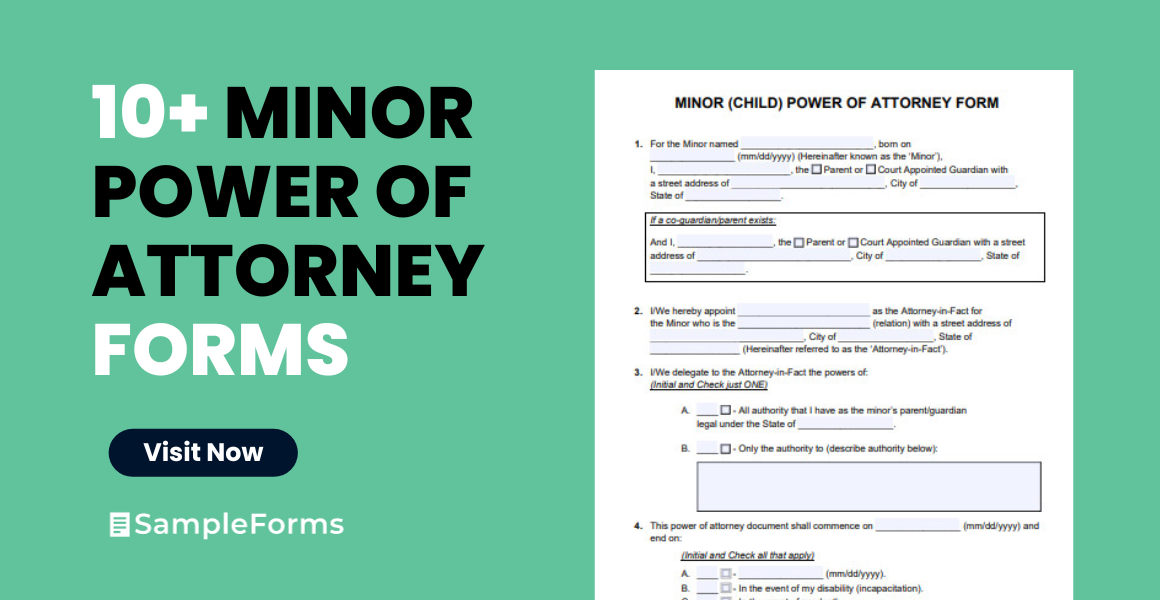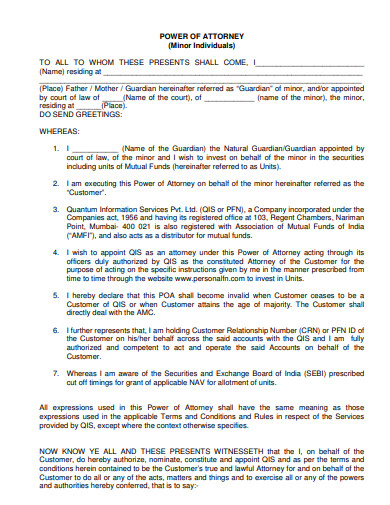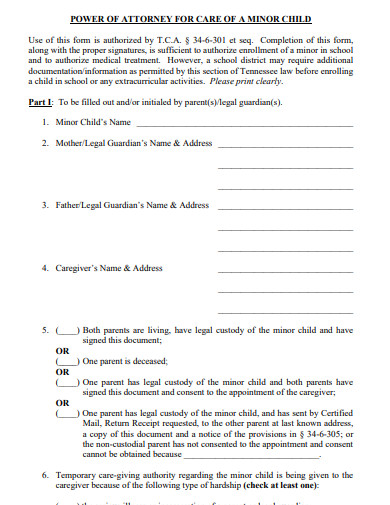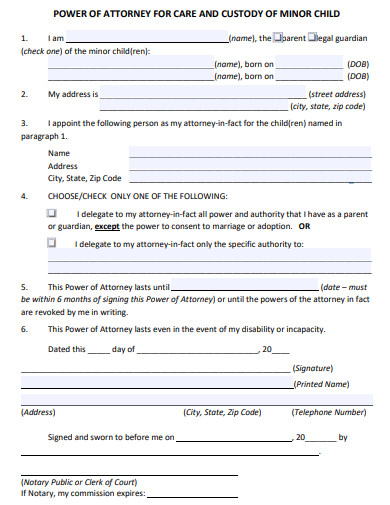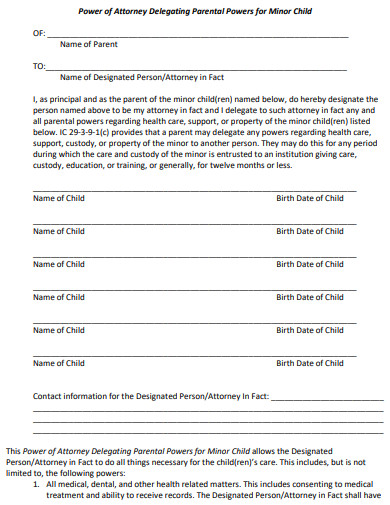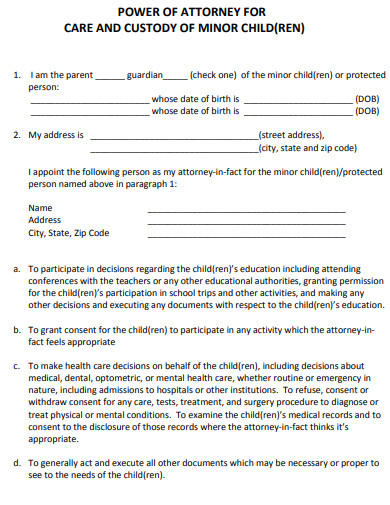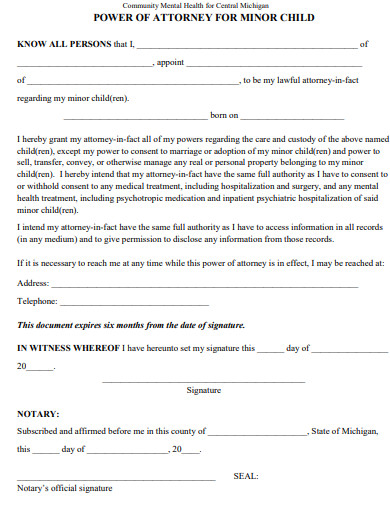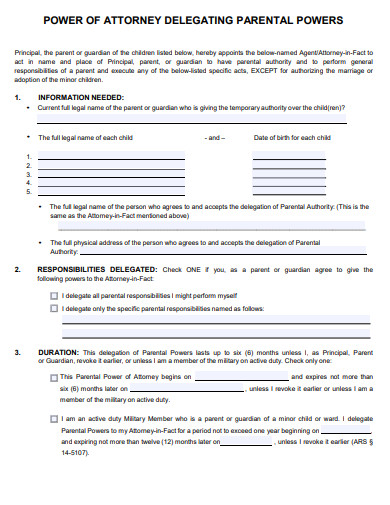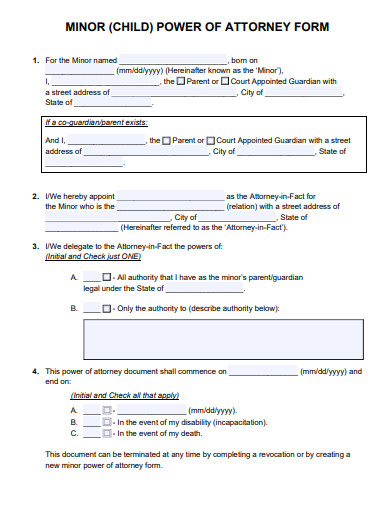Embark on a journey to safeguard your child’s future with a Minor Power of Attorney Form. This pivotal legal document allows parents to assign a trusted guardian to make vital decisions on their child’s behalf. Tailored to various needs, from education to healthcare, this guide will navigate the nuances of different types, present real-world examples, and provide a blueprint for creation, along with expert tips to ensure the form stands as a bastion of care and responsibility.
What is the Minor Power of Attorney Form ? – Definition
A Minor Power of Attorney Form is a legal document that allows a parent or guardian to grant another adult the authority to make decisions and care for their minor child temporarily. Thes form can cover decisions related to the child’s education, health, and general welfare. It is often used when parents are traveling, dealing with health issues, or in other situations where they cannot be present to care for their child.
What is the Meaning of the Minor Power of Attorney Form?
The Minor Power of Attorney Form embodies a legal safeguard, a document that parents or guardians use to appoint a trusted adult to act in their stead for the care and decision-making concerning their child. The form is a temporary delegation of parental authority, intended to ensure the child’s needs are met when the parents are unavailable due to various circumstances like absence, illness, or incapacity. It serves as a bridge of care, maintaining the child’s well-being through appointed guardianship.
What is the best Sample Minor Power of Attorney Form?
[Your State] Minor Child Power of Attorney Form
I. The Parties
Grantor(s) [Parent(s)/Legal Guardian(s)]:
- Name(s): ________________________________________
- Address: ________________________________________
- Phone Number: ________________________________
- Email Address: _________________________________
Attorney-in-Fact [Agent]:
- Name: ________________________________________
- Address: ________________________________________
- Phone Number: ________________________________
- Email Address: _________________________________
II. Minor Child:
- Name: ________________________________________
- Date of Birth: ________________________________
- Social Security Number (optional): ________________
III. Grant of Power
For the period beginning __________, 20, and ending __________, 20, I/we, the undersigned, hereby appoint the above-named Attorney-in-Fact as my/our true and lawful attorney to act in the capacity of the legal guardian for my/our child in my/our absence.
The Attorney-in-Fact shall have the power to make all decisions regarding the health, education, and welfare of the minor child, including but not limited to:
- Consent to medical, dental, and mental health treatment;
- Enrollment in educational institutions and programs;
- Participation in extracurricular activities;
- Access to child’s records.
IV. Special Instructions:
V. Governing Law
This Power of Attorney shall be governed by the laws of the State of [Your State].
VI. Signatures
Grantor’s Signature: _____________________________
Date: _______________
Co-Grantor’s Signature (if applicable): ______________
Date: _______________
Attorney-in-Fact’s Signature: ______________________
Date: _______________
VII. Notarization
[Notary Public Section with Notary Seal]
This sample Minor Child Power of Attorney Form is provided for informational purposes only and does not constitute legal advice. The laws governing Power of Attorney for a minor child vary by state and country, and this form may not be appropriate for your specific circumstances. It is highly recommended to consult with a legal professional before using this form to ensure it meets all legal requirements in your jurisdiction and is tailored to your particular situation.
1. Minor Power of Attorney Form Template
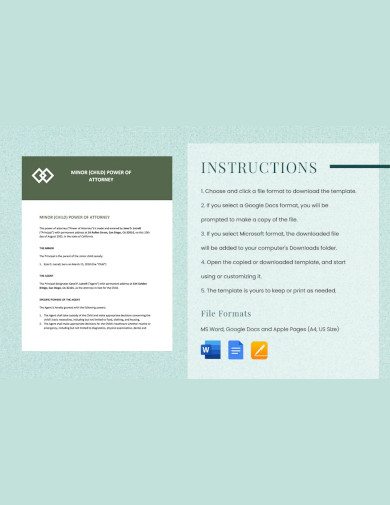
2. Minor Child Power of Attorney Form Template
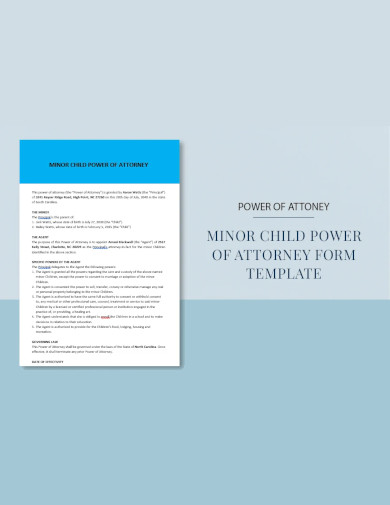
3. Simple Minor Power of Attorney Form
4. Georgia Minor Power of Attorney Form
5. Florida Minor Power of Attorney Form
6. Blank Minor Power of Attorney Form
7. Colorado Minor Power of Attorney Form
8. Printable Minor Power of Attorney Form
9. Minor Child Power of Attorney Form
10. Minor Power of Attorney Parental Powers Form
11. Hawaii Minor Power of Attorney Parental Powers Form
Who should I choose as the agent for Power of Attorney ?
Choosing an agent for a Power of Attorney is a significant decision. The person you select should be:
- Trustworthy: They will have extensive control over your affairs, so trust is paramount.
- Reliable: They need to be dependable and organized to handle tasks efficiently.
- Competent: The agent should be capable of understanding and managing financial, legal, or medical matters.
- Aligned with Your Values: They should respect and adhere to your wishes and preferences.
- Available: Consider their ability to commit time to manage your affairs effectively.
- Willing: Make sure they are willing to take on the responsibilities and duties involved.
- Financially Responsible: If they will handle financial decisions, they should have a solid record of financial prudence.
- Good Communicator: They should be able to communicate effectively with other family members, professionals, and institutions.
It’s often advisable to choose someone who lives nearby and can handle tasks in person if necessary. It’s also prudent to discuss the role with them in advance to ensure they’re prepared to act in your best interest.
Can minor become a power of attorney?
Typically, a minor (someone under the age of 18 in most jurisdictions) cannot become a power of attorney due to legal age restrictions on the ability to enter into contracts and other legal agreements. However, here are the steps to understand and address this question:
Step 1: Legal Age Requirement
Check the legal age requirement in your state or country, as an agent under a power of attorney usually must be a legal adult.
Step 2: Consult State Laws
Review your local laws or consult a legal professional to confirm the age at which an individual is considered competent to act as an agent.
Step 3: Understand Contractual Capacity
Recognize that acting as an agent under a power of attorney involves entering into legal agreements, which typically requires the agent to have full legal capacity.
Step 4: Consider Alternatives
If a minor is involved and needs to grant or receive authority for decision-making, other legal mechanisms such as guardianship or trusts might be more appropriate.
Step 5: Seek Legal Counsel
For specific situations or if the laws are not clear, seek advice from a lawyer who specializes in estate planning or family law.
In general, while a minor may be the subject of a power of attorney document—meaning someone else is making decisions on their behalf—a minor cannot be appointed as an agent due to the legal requirement for contractual capacity.
What parental rights does it give the agent?
A Power of Attorney (POA) can grant an agent various parental rights to act on behalf of the parent. These may include the right to:
- Make Medical Decisions: Consent to medical treatments and access the child’s medical records.
- Educational Authority: Enroll the child in school, access educational records, and make decisions regarding the child’s schooling.
- General Welfare: Decide on the child’s living arrangements, extracurricular activities, and overall daily care.
- Travel Consent: Authorize travel, both domestic and international, and obtain necessary documentation for the child.
- Financial Decisions: Manage the child’s finances, including allowances, savings, or any income the child may have.
- Legal Representation: Represent the child in legal matters, if specified within the POA.
The specific rights granted depend on what the parent includes in the POA document, and it can be as broad or as limited as the parent chooses. It’s important to note that while the agent assumes these rights temporarily, they do not override the parent’s fundamental rights, and the parent can usually revoke the POA at any time.
What are the laws governing Minor Child Power of Attorney by state?
The laws governing Minor Child Power of Attorney (POA) vary by state, each with its own statutes defining how such documents are created and used. Here are some common aspects addressed by state laws:
- Duration: Some states limit the duration a Minor Child POA can be in effect, often not exceeding a year without renewal.
- Scope of Authority: States may specify which decisions an agent can make on behalf of the child, such as medical, educational, or general welfare.
- Execution Requirements: Many states require the POA to be notarized, and some may also require witnessing.
- Revocation: The laws often outline the process by which a Minor Child POA can be revoked by the parent or guardian.
- Agent Qualifications: States may have criteria regarding who can serve as an agent, such as age requirements or the necessity to not have a conflicting interest.
- Recognition: Some states have reciprocal recognition of POAs executed in other states, while others require a state-specific form.
- Protection from Liability: Laws may protect agents acting in good faith under a POA from liability for the child’s expenses.
It’s important to consult the specific laws of your state or seek legal advice to ensure any Minor Child POA you create complies with local requirements and fully protects the child’s interests.
How to Give Minor Power of Attorney?
Giving Minor Power of Attorney involves several key steps to ensure it’s done correctly and legally. Here’s a general guide:
Step 1: Understand State Laws
Familiarize yourself with the specific laws in your state regarding Minor Power of Attorney to ensure compliance.
Step 2: Choose an Agent
Select a trustworthy and capable individual who can assume the responsibilities outlined in the Power of Attorney.
Step 3: Define the Powers
Clearly specify the scope of decisions the agent is allowed to make on behalf of the minor, such as medical, educational, or financial decisions.
Step 4: Draft the Document
Prepare the Power of Attorney document, either by using a state-provided form, a template, or with the assistance of a legal professional.
Step 5: Discuss with the Agent
Talk to the chosen agent about their duties and responsibilities, ensuring they understand and agree to them.
Step 6: Execute the Form
Sign the document in the presence of a notary public and, if required, witnesses. Make sure the agent also signs the form if necessary.
Step 7: Provide Copies
Give a copy of the notarized document to the agent, and keep one for your records. You may also need to provide copies to schools, healthcare providers, or other relevant entities.
Step 8: Revisit as Needed
Regularly review the Minor Power of Attorney to ensure it remains up-to-date and continue to meet the child’s needs. Be prepared to revoke or update it as circumstances change.
Step 9: Store Safely
Keep the original document in a secure place where it can be accessed when needed.
Always remember that a Minor Power of Attorney is a significant legal action, and seeking the guidance of a legal professional can help avoid any issues related to its validity or execution.
How to Create the Minor Power of Attorney Form? – a Step by Step Guide
Creating a Minor Power of Attorney Form involves careful attention to detail and a clear understanding of what powers you want to grant to the designated agent. Here’s a step-by-step guide:
Step 1: Determine the Need
Identify why you need a Minor Power of Attorney and what decisions it should cover, such as education, healthcare, or general welfare.
Step 2: Choose the Agent
Select a trustworthy individual who will act as the temporary guardian for the minor.
Step 3: Draft the Form
Begin with a title that reflects the document’s purpose, such as “Minor Power of Attorney.”
Step 4: Principal’s Information
Include the full legal name, address, and contact information of the parent or legal guardian.
Step 5: Minor’s Information
List the minor’s full name, date of birth, and address.
Step 6: Agent’s Information
Provide details for the appointed agent, including their full name, relationship to the minor, and contact information.
Step 7: Powers Granted
Clearly specify the extent of the agent’s authority, detailing what they can and cannot do on behalf of the minor.
Step 8: Duration
State the effective date and the expiration date of the Power of Attorney.
Step 9: Additional Clauses
Consider adding clauses for emergency medical decisions and educational consent.
Step 10: Signatures
Have the parent or legal guardian sign the form in the presence of a notary.
Step 11: Notarization
Complete the notarization process to legally acknowledge the document.
Step 12: Copies
Make copies of the notarized document for the agent, the minor’s records, and any institutions that require it.
Step 13: Safe Storage
Keep the original document in a safe and accessible place.
Step 14: Legal Consultation
Consider consulting a legal professional to ensure the document complies with your state laws and fully protects the minor’s interests.
Following these steps will help you create a comprehensive and legally sound Minor Power of Attorney Form that clearly outlines the temporary guardian’s role and responsibilities.
Tips for creating an Effective Minor Power of Attorney Form
A Minor Power of Attorney Form is a legal document granting an appointed guardian the authority to make decisions for a child when parents are unavailable. It’s crucial for temporary caregiving situations, allowing seamless decision-making for the child’s welfare. This guide outlines the form’s significance, types, and drafting process, providing a clear pathway to creating a document that ensures a child’s needs are met with trusted guidance.
Related Posts
-
FREE 5+ Minor Child Power of Attorney Forms in PDF | MS Word
-
10+ Free New Hampshire (NH) Power of Attorney Form Download – How to Create Guide, Tips
-
10+ Free Nevada (NV) Power of Attorney Form Download – How to Create Guide, Tips
-
10+ Free Nebraska (NE) Power of Attorney Form Download – How to Create Guide, Tips
-
10+ Free Montana (MT) Power of Attorney Form Download – How to Create Guide, Tips
-
10+ Free Missouri (MO) Power of Attorney Form Download – How to Create Guide, Tips
-
10+ Free Minnesota (MN) Power of Attorney Form Download – How to Create Guide, Tips
-
10+ Free Mississippi (MS) Power of Attorney Form Download – How to Create Guide, Tips
-
10+ Free Massachusetts (MA) Power of Attorney Form Download – How to Create Guide, Tips
-
10+ Free Maryland (MD) Power of Attorney Form Download – How to Create Guide, Tips
-
10+ Free Maine (ME) Power of Attorney Form Download – How to Create Guide, Tips
-
10+ Free Louisiana (LA) Power of Attorney Form Download – How to Create Guide, Tips
-
10+ Free Kentucky (KY) Power of Attorney Form Download – How to Create Guide, Tips
-
10+ Free Kansas (KS) Power of Attorney Form Download – How to Create Guide, Tips
-
10+ Free Iowa (IA) Power of Attorney Form Download – How to Create Guide, Tips
